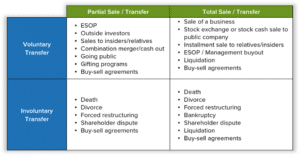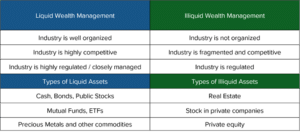A quick Google search for “how to increase business wealth” will yield thousands of ideas. Some are worth as much as they cost, some promise quick, overnight results, and yet, some truly hold their weight.
Pinion strategic advisors work with business owners every day to help drive profits, manage risk, live out their company mission and find opportunities for growth.
Here, they share three important, yet commonly overlooked, tried-and-true methods for building private company wealth.
1. Obtain regular valuations of your business.
Most business owners treat valuations as a reaction to a life change. In fact, 90% of valuations are completed because of a triggering event like the sale of a business, divorce, marriage, etc. What the other 10% understands is that valuations serve as a valuable measuring tool to guide their business strategy along its journey – not just at the end of it.
Valuations play a pivotal role in identifying key value drivers for your business. Regularly assessing your business through valuations provides a comprehensive scorecard, highlighting what is and isn’t working. This ongoing evaluation allows for strategic adjustments along the way, preventing any surprises or sticker shock when the time comes to sell or transition your business to the next generation.Top of Form
“The 10% who understand this are able to focus on their true value drivers and increase their wealth in the long-term,” explains Michelle Ellis, Pinion valuation expert. “Those who wait until a critical point of change leave money on the table.”
Pinion Pro Tip: Conduct regular business valuations to determine both the value of your business and the best way to plan, pivot and position yourself for long-term success.
2. Plan for future transitions.
The reality of being a business owner is that one day, you won’t own your business. Too often, we see business owners paying the price of reacting to triggering events such as the sale of the business, a divorce, a death, or other voluntary or involuntary transfers illustrated below (Figure 1).
“Planning for the inevitable day when you no longer own your business can help you run it better today,” encourages Ellis. “Merely having these checks in place compels owners to perform at a more optimal, flexible and adaptable level.”

Forbes explains it this way, “Being surprised by or mishandling a disruption to the flow of operations can affect a company’s reputation and credibility, and in severe cases, it can stop business operations altogether.”
Pinion Pro Tip: Invest in business tools like succession planning, wills, life insurance on key stakeholders, estate planning etc. Put plans in place before they’re urgent and necessary.
3. Manage illiquid wealth as you would liquid wealth.
For many business owners, the largest asset on their personal balance sheet is the business. Therefore, it makes sense to manage that wealth with the same intensity, care and concern that liquid wealth would be managed. However, to increase your wealth, it’s important to monitor and treat your illiquid wealth like you would liquid wealth.
For example, with liquid wealth like bonds, stocks, and mutual funds, you receive a quarterly statement detailing exactly how your portfolio is performing. So, on any given month, you know where your investments sit. Paying this same attention to private company wealth is key to driving growth.
“Liquid wealth tends to be very closely managed while illiquid wealth tends to be more fragmented, less regulated and less organized,” explains Jim Rein, Pinion Next Gen advisor. “The techniques and conversations are certainly different, but they should not be looked at like two mutually exclusive buckets of wealth.”

Pinion Pro Tip: Treat your business like a personal investment. Pay attention to your share prices, measure capital appreciation and ROI on a regular basis and actively manage your company investments.
Pinion Business Valuation and Next Gen Planning experts help business owners unlock private company wealth. Contact us to learn how our advisory team can proactively uncover and manage the value drivers in your business.








